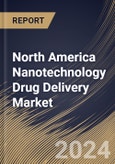Nanotechnology has emerged as a revolutionary paradigm in drug delivery, ushering in a new era of precision, efficiency, and targeted therapeutic interventions. Integrating nanoscale materials and technologies into drug delivery systems has opened avenes for overcoming longstanding challenges in the pharmaceutical industry, offering solutions to enhance drug bioavailability, improve targeting, and minimize side effects. The market has recently experienced substantial expansion and acceptance, propelled by the unwavering quest for novel approaches to tackle the intricate challenges of contemporary healthcare.
In addition, the adoption of nanotechnology in drug delivery has been a transformative force in the pharmaceutical landscape. The urgency to maximize the therapeutic efficacy of drugs, particularly in the treatment of chronic diseases such as cancer, cardiovascular disorders, and neurological conditions, is driving this adoption. Conventional drug delivery methods often face limitations related to poor solubility, non-specific distribution, and systemic toxicity. Nanotechnology offers a promising avenue to overcome these challenges, providing a platform for designing and engineering nanocarriers that can encapsulate and transport drugs with unprecedented precision.
The United States is a hub for nanotechnology research and development, and advancements in this field directly affect drug delivery. Researchers are exploring nanoscale drug carriers, such as nanoparticles and liposomes, which can enhance drug solubility, stability, and targeted delivery to specific cells or tissues. The U.S. government provides significant funding and support for nanotechnology research through agencies like the National Nanotechnology Initiative (NNI). As per the data from the National Nanotechnology Initiative of the United States, the 2022 economic impact of nanotechnology on the U.S. economy was between $67 billion and $83 billion, which is close to a trillion dollars over the past two decades. Thus, the rising nanotechnology sector in North America will help expand the regional market.
The US market dominated the North America Nanotechnology Drug Delivery Market, by Country in 2022, and would continue to be a dominant market till 2030; thereby, achieving a market value of $47,618.9 Million by 2030. The Canada market is experiencing a CAGR of 10.5% during (2023 - 2030). Additionally, The Mexico market would exhibit a CAGR of 9.6% during (2023 - 2030).
Based on Formulation, the market is segmented into Polymer-Based Nanomedicine, Lipid-Based Nanomedicine, Nanocrystals, and Others. Based on Application, the market is segmented into Oncology & Hematology, Infectious Diseases, Orthopedics, Neurology, Immunology, Urology, and Others. Based on countries, the market is segmented into U.S., Mexico, Canada, and Rest of North America.
List of Key Companies Profiled
- AbbVie, Inc.
- Pfizer Inc.
- Johnson & Johnson (Johnson & Johnson Services, Inc.)
- Novartis AG
- Bristol-Myers Squibb Company
- AstraZeneca PLC
- Amgen, Inc.
- Merck KGaA
- Teva Pharmaceutical Industries Ltd.
- Sanofi S.A.
Market Report Segmentation
By Formulation- Polymer-Based Nanomedicine
- Lipid-Based Nanomedicine
- Nanocrystals
- Others
- Oncology & Hematology
- Infectious Diseases
- Orthopedics
- Neurology
- Immunology
- Urology
- Others
- US
- Canada
- Mexico
- Rest of North America
Table of Contents
Companies Mentioned
- AbbVie, Inc.
- Pfizer Inc.
- Johnson & Johnson (Johnson & Johnson Services, Inc.)
- Novartis AG
- Bristol-Myers Squibb Company
- AstraZeneca PLC
- Amgen, Inc.
- Merck KGaA
- Teva Pharmaceutical Industries Ltd.
- Sanofi S.A.








